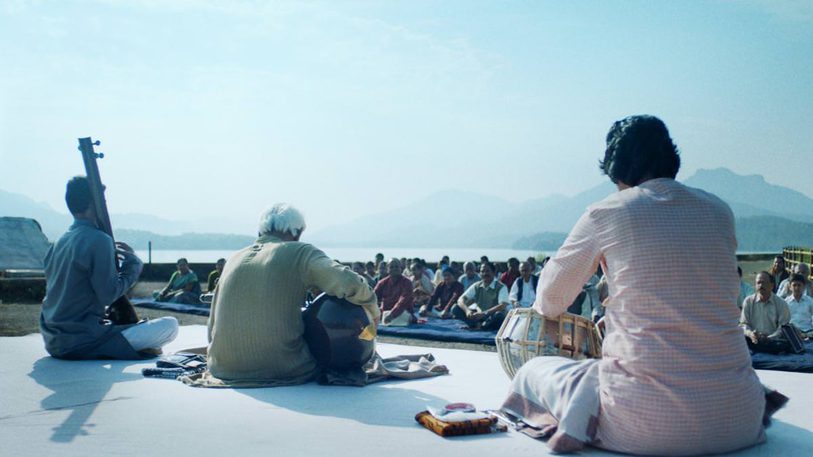News Story
Shehroze Khan, Director's Assistant and member of Film London's Equal Access Network, viewed The Disciple as part of the BFI London Film Festival. Here he shares his reflections on the film and his journey into the film industry.
Growing up as an anxious, overweight kid who moved numerous times with my parents and went to a few different schools, films were the only constant in my life. My avenue to have experiences outside my own, to think about perspectives that are completely different to mine, to believe that anything could truly be possible – it was nothing short of magic.
I joined the Equal Access Network because I have wanted to be a part of that magic for as long as I can remember. My journey has not been easy. I have sent hundreds of emails to industry people looking for work, made numerous applications, even been on a few interviews that seemed to have gone well, but for some reason, I never got the whole way. Without getting a foot in the door, the Film/TV industry can seem like climbing Everest. I didn’t have any industry contacts, no one I knew even had an acquaintance who had successfully broken through. For my family, it seemed an impossibility that someone from our background could break into the British film industry. Everything changed for me when I connected with Film London and finally landed my first break on HBO’s The Third Day.

Shehroze Khan, Director's Assistant and member of Film London's Equal Access Network
Through the EAN, I also saw The Disciple as part of the London Film Festival. It’s an Indian Marathi independent film written, directed and even edited by Chaitanya Tamhane who saw strong acclaim with his debut film, Court. The film follows Sharad, who devotes his life to becoming a classical Khayal music vocalist through the intimate mentorship of his guru.
“What is khayal? It is the the state of mind of the singer at that time. in that particular moment. he presents that state through the medium of a Raag.”
On paper, there could be strong parallels drawn with Damien Chazelle’s Whiplash, in its exploration of following the personal sacrifice an artist must endure to truly achieve excellence. This film takes that notion a step further by posing the question of whether everyone is cut out for this path, or whether some people might be fated for mediocrity despite their best efforts.
“If you want the truth of the raag to spontaneously reveal itself, you will have to rid your mind of falsehood, greed and impure thoughts. Not everyone has the inherent discipline and faith required for this."
Indian cinema for me has been a love/hate relationship. As a Pakistani, I grew up with mainstream Bollywood all around me, whether it was dancing to it at weddings, or watching films where it seemed a rule of thumb that people could burst into song at any moment and transport to Switzerland in the middle of an emotional climax. As an adolescent film snob whose favourite film was Donnie Darko at the age of 10, I naively thought Bollywood was poor cinema and pretentiously never gave it a chance simply because it was too ‘unrealistic’. I have later grown a real appreciation for Bollywood, and in recent years, a strong love for the thriving independent scene coming out of India, particularly those in languages other than Hindi.

The Disciple, dir. Chaitanya Tamhane
Alfonzo Cuaron served as Executive Producer on this film, and through the Rolex Mentor and Protégé scheme, has been something of a guru for Chaitanya himself. Chaitanya spent time on the set of Roma, where Cuaron convinced him to edit the film himself because he felt no one could know the beat of the story more than Chaitanya himself. Cuaron also recommended Michal Sobocinski as the cinematographer, who brought an astounding, mesmerising and electrifying quality to the look of the film. The collaboration lead to a film that seems very brave for a second-time filmmaker, with very long takes, gorgeous symmetrical shots and very slow push-ins that add to the themes of extreme precision and discipline required to perfect the complex raags of khayal music. It lends to a film experience that feels very intimate and tender, yet never slow. These devices only amplify the pitch-perfect performances by the cast, in particular Aditya Modak who plays Sharad and undergoes a transformation akin to De Niro in Raging Bull. Subtle, restrained, and almost tragic in his portrayal of a devotee who would sacrifice anything to master his craft, yet just can’t seem to get out of his own head. Last but not least, it is impossible not to mention Aneesh Pradan’s score which sets the tone so perfectly, giving us an experience between performance and film music, and is equal parts soothing and haunting.
I cannot recommend this gorgeous work of art more. Everyone must watch this film.
The Disciple is part of The Create Strand of BFI London Film Festival, supported by the Mayor of London and Film London